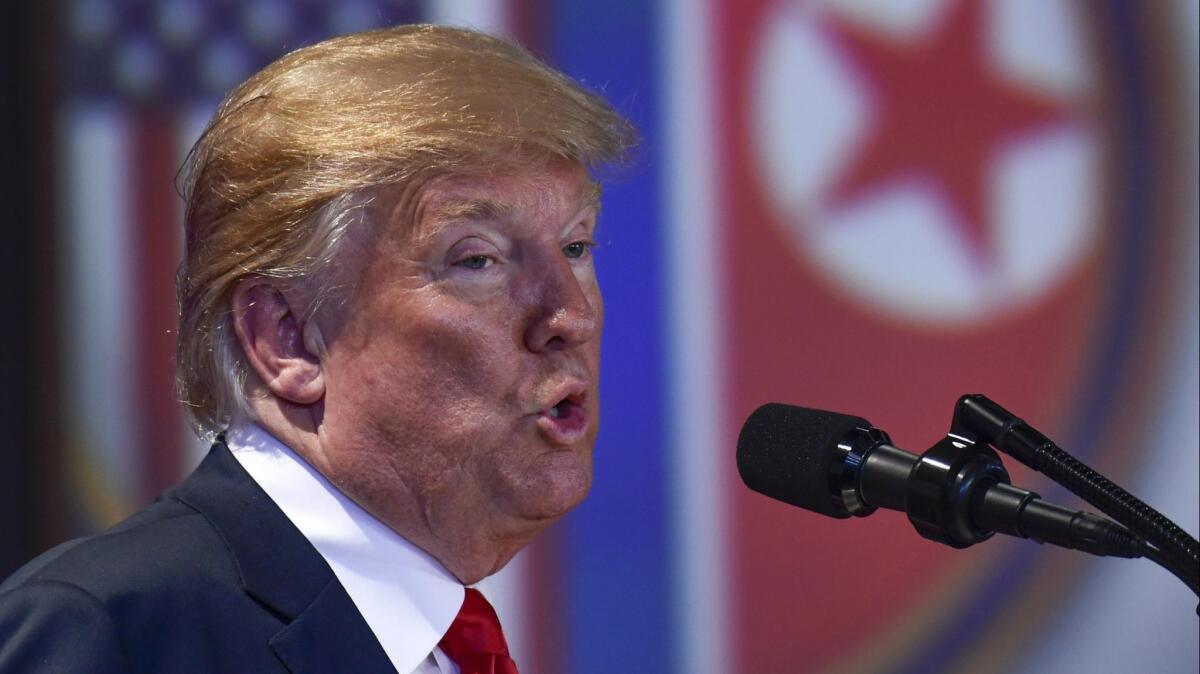Editorial: Trump’s weird adventure in Singapore ended inconclusively

- Share via
In evaluating President Trump’s dramatic meeting with North Korean dictator Kim Jong Un, it’s important to remember that less than a year ago many Americans were concerned that the bellicose rhetoric of the two leaders — including Trump’s threats to rain “fire and fury” on North Korea if it continued to menace the United States — might lead to war.
Trump’s decision to respond to an overture from Kim de-escalated the rhetoric dramatically. Conceivably, it may also have begun a process that will succeed in reining in North Korea’s nuclear ambitions where past efforts failed.
That possibility justifies the summit in Singapore, despite the chaos and confusion that preceded the meeting and the bombast that followed it.
Trump was characteristically exaggerating — or fantasizing — when he boasted that the meeting was a “tremendous 24 hours” that proved that “real change is indeed possible,” and when he talked about the “great chemistry” between himself and Kim. (“He’s got a great personality. … I think he liked me, and I like him.”)
For all the spectacle, the meeting was at best inconclusive. For all the gushing flattery Trump directed toward a man universally known as a murderous despot, very little was actually decided, accomplished or nailed down.
For all the gushing flattery Trump directed toward a man universally known as a murderous despot, very little was actually accomplished or nailed down.
That was clear in the vaguely worded joint statement released by the two leaders. Trump promised to provide North Korea unspecified “security guarantees,” and Kim reaffirmed his “firm and unwavering commitment to complete denuclearization of the Korean Peninsula.” They also agreed to seek improved relations between the two countries and a “lasting and stable peace regime on the Korean Peninsula,” and to launch an effort to recover and repatriate the remains of soldiers killed in the Korean War.
The details — in other words, everything we need to know about whether this effort will go somewhere or fizzle out quickly — were left to future negotiations, in which the United States will be represented by Secretary of State Mike Pompeo.
Pompeo, it’s important to note, has said that the only outcome the U.S. will accept is the “complete and verifiable and irreversible denuclearization of the Korean peninsula.” That suggests how difficult the negotiations will be, especially if Trump insists on applying to North Korea the standards by which he judged — and found wanting — the agreement under which Iran accepted limitations on its nuclear program.
We would like to think that Trump recognizes the complexity of the negotiating path ahead, the need for consultation with U.S. allies and the importance of reckoning with North Korea’s history of brutality toward its own people and duplicity in dealing with other nations. But frankly, there’s been no indication that he does.
In an interview with the Voice of America, Trump gushed: “We’re going to de-nuke North Korea. It’s going to start immediately,” though he also acknowledged to reporters that it would “take a long time” to accomplish that objective. That’s an understatement. North Korean’s nuclear weapons program is highly advanced, and denuclearization could take 10 to 15 years.
After meeting with Kim, the president told reporters that he had decided to cancel “war games” — his term for joint U.S.-South Korean military exercises — which he called “provocative,” language North Korea has long used in complaints about the exercises. The news seemed to come as a surprise to both the U.S. military and South Korean officials. A South Korean Defense Ministry spokesman said officials were still seeking the “exact meaning and intention” of Trump’s comments about the exercises.
Finally, even if one accepts that Trump had to meet with Kim, the effusive compliments he paid to the brutal dictator (just a few days after he unceremoniously lit into Canadian Prime Minister Justin Trudeau and other long-time allies) were unsettling. Kim “loves his people,” Trump told the Voice of America. Asked about human rights abuses in North Korea, the president acknowledged that “it’s a rough situation over there” but added that “it’s rough in a lot of places, by the way.”
This about the leader of a country where thousands of citizens have been murdered, tortured, imprisoned or raped, and where roughly 18 million people don’t get enough food, according to the United Nations.
Effervescent optimism and fulsome flattery may be an advantage in a salesman, but a president needs to watch his words and weigh his actions.
Follow the Opinion section on Twitter @latimesopinion and Facebook
More to Read
A cure for the common opinion
Get thought-provoking perspectives with our weekly newsletter.
You may occasionally receive promotional content from the Los Angeles Times.






